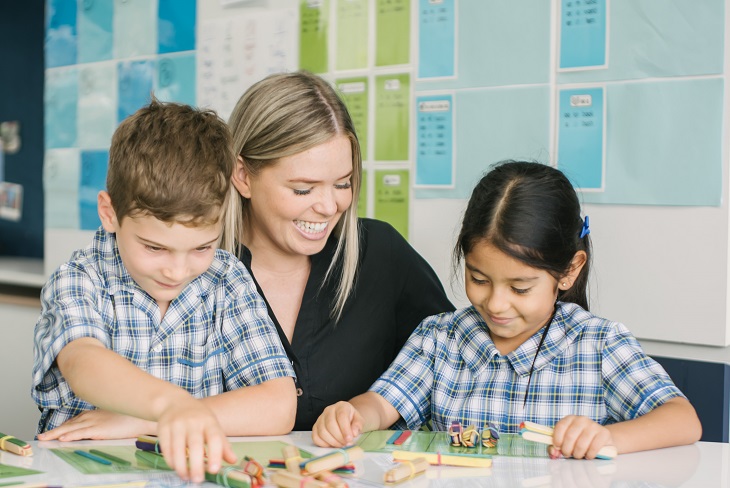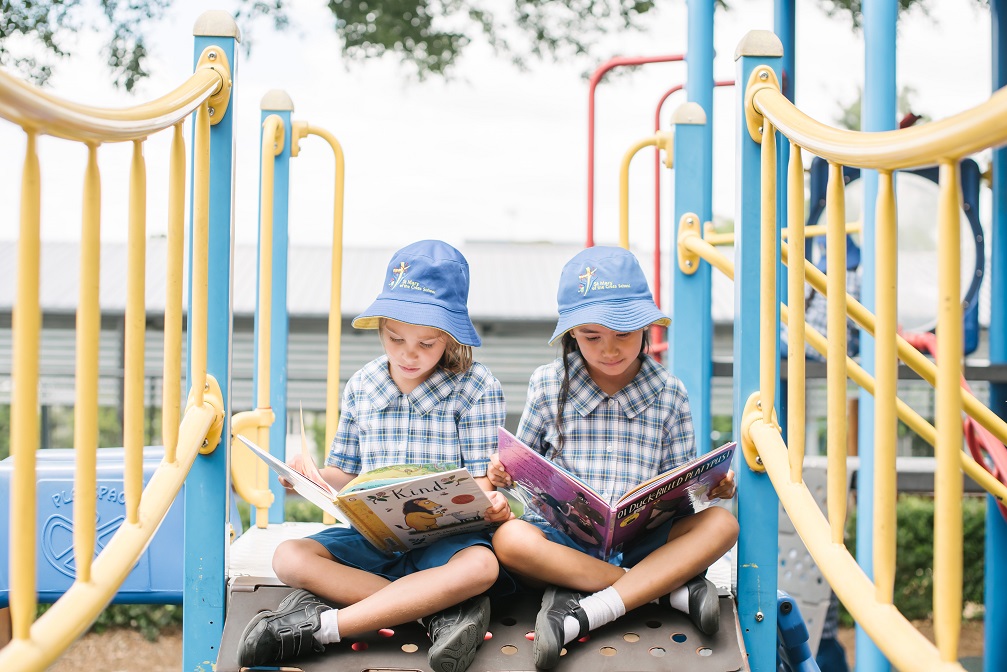In 2012, we commenced implementation of the Australian Curriculum in the Learning Areas of English, Mathematics and Science, with History beginning in 2013, together with the implementation of the new Archdiocesan Religious Education Curriculum. 2014 saw the implementation of the Geography curriculum, and from 2015, as guided by the Australian Curriculum, Assessment and Reporting Authority (ACARA), we will progressively commence enactment of the ‘phase 2’ curriculum areas, including The Arts, Health and Physical Education, Civics and Citizenship, Languages, Economics and Business, and Technology.
As we transition towards the full implementation of the Australian Curriculum we further acknowledge and value the General Capabilities of: Literacy
Numeracy Information & Communication Technology
Critical and creative thinking Personal and social competence Ethical behaviour Intercultural understanding.
These work with the Cross Curricular Priorities of:
These General Capabilities and Cross Curricular Priorities are developed in relation to each of the Learning Area Curricula developed by the Australian Curriculum, Assessment and Reporting Authority (ACARA), the Queensland Studies Authority (QSA) and Brisbane Catholic Education. These Learning Areas include, at present: Religious Education English Mathematics Science History Studies of Society and Environment Health and Physical Education The Arts Technology and Cultural Literacy and Languages
| 

|
In teaching and learning, the focus is on the learner: what the learner knows (content), what the learner can do with this knowledge (competence) and what the learner can be like (confidence). Teachers plan programs consistent with the General Capabilities, the Cross Curricular Priorities, and the Learning Area Curriculum. This is guided by the Archdiocesan Vision our school’s Vision for Learning and Teaching. A Curriculum Support teacher assists classroom teachers with the development of school programs.
To support classroom teachers, a number of specialist teachers provide students with expertise in given areas. These areas include Health and Physical Education, Language Other Than English (LOTE – Spanish), Library skills and Music. In addition St Mary of the Cross has a Support Teachers - Inclusive Education (ST-IE) who provide support for students who have diverse educational needs.
Teachers at St Mary of the Cross are progressive in their attitudes towards educational change and are constantly updating through professional development to enhance teaching and learning. The curriculum development process is, therefore, one of continual review and refinement. However, ‘the basics’ remain a fundamental component of education at St Mary of the Cross.
Physical Education
At St Mary of the Cross we have a specialist Physical Education teacher who conducts regular lessons across all year levels. An active Physical Education program instructing all classes in a variety of physical skills and developmental activities operates throughout the school. The program includes elements of daily fitness and the development of physical skills across a wide variety of activities/sports. In addition to this, children in the middle and upper school are involved in a sports program with other schools, usually during Terms 2 and 3.
In Term 4, an extensive swimming program is conducted for all year levels by experienced professional coaches at Newmarket Pool. Learning experiences include stroke correction, life saving and a carnival.
Personal Development
Each teacher encourages and nurtures the children in recognising their individual worth and developing strong self esteem. By developing a pride in themselves, our students develop a sense of pride in their school - a place where they belong and are cared for. This is further enhanced by the personal development and pastoral care programs which operate throughout the school.
At St Mary of the Cross there is a strong school spirit - a sense of community. The children are actively encouraged to take pride in their school and to take care of the grounds, buildings and equipment. There is active participation in the community and a raising of awareness to the needs of others through special research projects or fundraising activities with presentations at school assemblies.
Reporting
Reporting concerns the way that information on and about student learning is communicated to others, including parents. At St Mary of the Cross School, reporting is viewed as an important and integral part of teaching and learning. There are many and varied ways of reporting a child’s progress throughout the year. Each has a different purpose and provides different information. No single method can be left to carry the whole burden of reporting. Many acknowledge the important role of the end of semester Written Report however we are wise to remember that the most effective reporting occurs when various approaches are used throughout the year.
The following is an overview of the reporting process that is currently used at St Mary of the Cross. It needs to be considered within the context that the school community is required to operate under government legislative requirements. Further, it is our intention to review reporting practices and procedures once the implications of the Australian Curriculum on reporting are clarified.
TERM 1
Years Prep - 6 Parent/Teacher Information Evening (early in term) – Generally whole year level gathering, followed by breaking into individual classes. Information sharing focus.
Class / Year Level Newsletter – Generally at the beginning of term or at the commencement of new units of work. This varies with each year level, typically being more frequent in the early years.
School Website Year Level and Class Term Overviews – Provides important information about Year Level and Class teaching and learning focus and important events for the term.
Student Support Team Meetings for children experiencing difficulties or requiring extension (ongoing throughout term).
Formal Reviews for students verified under Commonwealth Government guidelines (each semester), including the development and review of Independent Education Plans (IEPs).
TERM 2
Class / Year Level Newsletter – Generally at the beginning of term or at the commencement of new units of work. This varies with each year level, typically being more frequent in the early years.
School Website Year Level and Class Term Overviews – Provides important information about Year Level and Class teaching and learning focus and important events for the term.
Student Support Team Meetings for children experiencing difficulties or requiring extension (ongoing throughout term).
Years P - 6 formal Written Report – End of term.
Parent / Teacher Interviews (end of term for Years 6) – Teacher requested. Parents make an appointment and share insights concerning their child, with class teachers sharing information concerning child’s progress.
TERM 3
Class / Year Level Newsletter – Generally at the beginning of term or at the commencement of new units of work.
Student Support Team Meetings for children experiencing difficulties or requiring extension (ongoing throughout term).
Formal Reviews for students verified under Commonwealth Government guidelines (each semester), including the development and review of Independent Education Plans (IEPs).
Year 3 / 5 Test Results to be forwarded home – Generally, end of term.
TERM 4
Class / Year Level Newsletter – Generally at the beginning of term or at the commencement of new units of work.
School Website Year Level and Class Term Overviews – Provides important information about Year Level and Class teaching and learning focus and important events for the term.
Student Support Team Meetings for children experiencing difficulties or requiring extension (ongoing throughout term).
Prep Parent Information Evening for parents of the following year’s intake of Prep students.
Prep Orientation for the following year’s prep students, and their parents.
Years P - 6 formal Written Report – End of term.
Option for Parent or Teacher Requested Interview – End of term. For Year 6 this process is generally teacher requested. Parents make an appointment, with the class teachers sharing information concerning the child’s progress.
As individuals, teachers will also choose to make use of a variety of avenues of reporting during the year, such as weekly, monthly and/or term newsletters, assignment /task details, open nights / days, parent updates, and class displays or celebrations of learning. Anecdotal reporting and informal discussions, particularly in the early years, are also common. This flexibility allows teachers to establish a system of effective communication, which meets the needs of parent/s, teacher and child.
Parents and teachers can request interviews at any time throughout the year, by advance appointment, for the convenience of both parent and teacher.
 Camps and Excursions
Camps and Excursions
In Years 4 – 6, camps are offered as an opportunity for the children to develop in ways which are not possible in the school classroom. They provide the children with an educational experience in co-operative living and allow the opportunity to use natural surroundings to help them to grow emotionally, socially, physically and spiritually. Parents are notified of class camps and their costs early in each school year.
Excursions and incursions (where the children stay on-site) are planned to complement particular curriculum areas and can occur at various times in the school year. The cost of these activities will be included in the school levies for the year. Most of the Camps are invoiced separately through the school fees.
Information Technology
Technology, as a learning area, provides students with opportunities to respond to design challenges and solve problems in a variety of situations by ‘working technologically’. This involves students drawing on their technology knowledge and practices.
Information, Communication and Learning Technology (ICLT) is an intrinsic part of education today. The use of computers supports and enhances the achievement of educational goals. For this reason digital literacy is introduced in Prep and a comprehensive and carefully graduated program is implemented through the primary years, with students having access to a variety of digital technologies. Classes integrate their work with information technology.
© Brisbane Catholic Education, St Mary of the Cross School (2023)